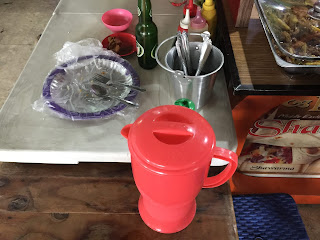Water Shortage Is Also Causing Increased Use of Disposables, More Garbage
The ongoing water service interruption affecting
customers of Manila Water in Metro Manila and adjacent places may be increasing
the demand for disposable products and packaging, and thus more garbage.
The EcoWaste Coalition, a waste and pollution watch
group, aired this concern as water supply in Manila Water-served areas remains
difficult with the water concessionaire announcing six to 20 hours of daily
service interruption until the start of the rainy season.
Due to the continuing water shortage affecting six
million people in the East Zone of Metro Manila, some eateries have turned to
disposable plates, spoons, forks and cups, mostly plastic-based, to avoid the
use of water. Some sellers even wrapped
plates with thin film plastic bags to avoid washing them.
“The increased demand for disposable items during this
time of water scarcity will surely add to the volume of residual garbage that
generators from households to business establishments churn out every day,”
said Aileen Lucero, National Coordinator, EcoWaste Coalition.
“With taps running dry, we fear that more people and
businesses will be encouraged to buy and use more single-use plastic
disposables during the waterless period,” she added.
As the World Consumer Rights Day is observed tomorrow,
March 15, the EcoWaste Coalition reminded Manila Water and the country’s water
authorities that access to clean water, a basic need, is a fundamental consumer
and human right.
“It’s sad that many Filipinos will mark the World
Consumer Rights Day in long queues for water rationed by Manila Water,” Lucero
said.
“The water shortage, we hope, will be resolved soon to
satisfy the people’s right to water, a basic consumer and human right, and to
discourage the wasteful use of plastic disposables,” she added.
The EcoWaste Coalition had earlier joined the chorus
calling for water conservation amidst the water shortage.
The group urged households, as well as private and public
establishments, to intensify water saving measures as the dry spell marches on.
“Let us all aim for zero water waste to reduce the
impacts of low water supply during the summer months to the people, especially
the poor, and the environment,” the group said.
To cut on water wastage, the EcoWaste Coalition has suggested the following water conservation tips:
1. Fix dripping
tanks, pipes, faucets, showerheads and hoses to prevent water loss.
2. Turn off the
tap while brushing your teeth, lathering with soap or shaving.
3. Take shorter showers with a pail and dipper and use
just enough water.
4. Reuse towels a
few times before putting them on the laundry basket.
5. Collect grey
water from bathing and washing and reuse it to wash the car, clean the garage,
maintain sidewalks or flush the toilet.
6. Place a brick
or water-filled bottle inside the toilet tank to reduce water used in every
flush and flush less.
7. Collect water dripping from air conditioners and use
the collected water for washing mops and rugs, flushing the toilet or watering
the plants.
8. Leave grass
clippings on the lawn as this cools the ground and holds in moisture.
9. Spread a layer of mulch around plants and trees to
retain water and reduce evaporation.
10. Water the plants early in the morning or in the
evening when temperature is cooler to minimize water loss.
11. Refrain from
using the washing machine if only washing a few clothes, do full loads of
laundry, and use just the right amount of detergent to avoid extra rinsing.
12. Wash fruits and vegetables in a basin and not in
running water; reuse the water for watering the plants.
13. Save the rice wash for washing the dishes or watering
plants.
14. Steam vegetables instead of boiling to conserve water
as well as preserve their nutrients.
15. Thaw frozen meat in the refrigerator overnight, not
on running water.
16. Use fewer cooking and dining utensils and dishes to
reduce water use for washing.
17. Choose the
proper pan and pot size for cooking as bigger ones may need more cooking water
than required.
18. Do not let the water run when washing the dishes,
fill one basin with wash water and the other with rinse water.
19. Soak dirty
pans and pots first instead of scraping them in running water.
20. Collect and
store rainwater for daily chores.
-end-







Comments